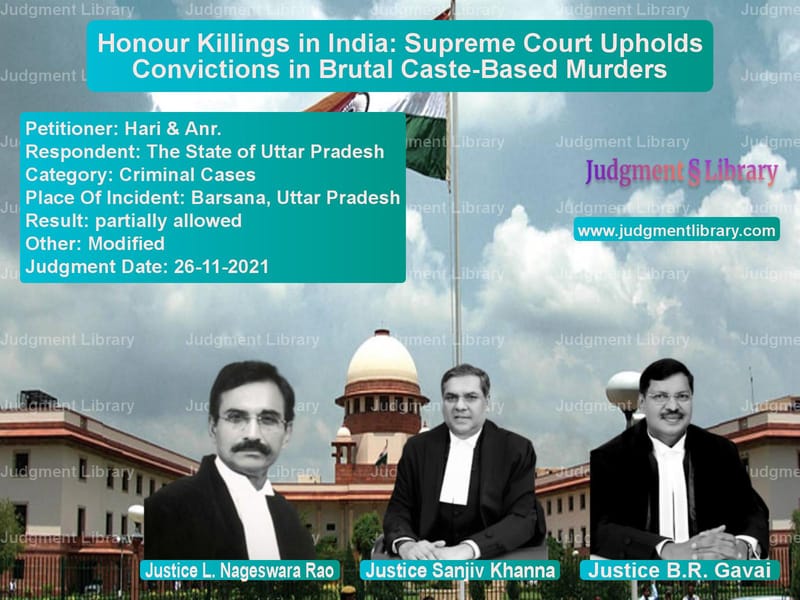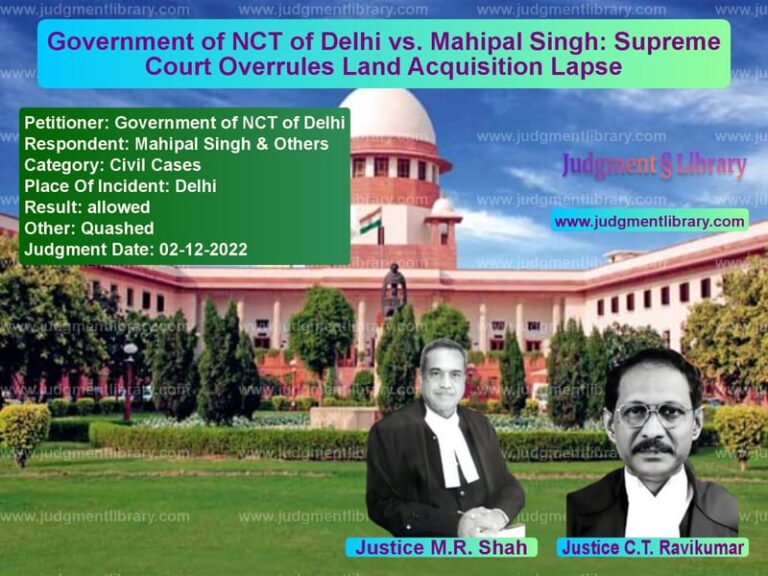Honour Killings in India: Supreme Court Upholds Convictions in Brutal Caste-Based Murders
The Supreme Court of India has upheld the convictions of multiple individuals involved in a gruesome case of caste-based honour killings in Uttar Pradesh. The case, Hari & Anr. vs. The State of Uttar Pradesh, revolves around the murder of three individuals—Vijendra, Ram Kishan, and Roshni—who were brutally killed after a village panchayat declared their inter-caste relationship unacceptable. The Court not only confirmed the convictions under Section 302/149 of the Indian Penal Code (IPC) but also emphasized the urgent need for witness protection and stricter enforcement of laws against honour crimes.
Background of the Case
The case dates back to March 26, 1991, when a village panchayat was convened in Barsana, Uttar Pradesh. The panchayat was called after Roshni, a girl from the Jat community, eloped with Vijendra, a boy from the Jatav community. Another individual, Ram Kishan, was also implicated in helping them. Upon their return to the village, they were forcibly brought before the panchayat, where their fate was decided by the dominant caste members.
The events that followed were horrifying:
- The victims were subjected to hours of physical torture, including being hung upside down and having their private parts burned.
- Their parents were forced to participate in their execution, tightening the noose around their necks.
- After their death, their bodies were burned in a cremation ground, with villagers preventing anyone from leaving or informing the police.
Despite the initial reluctance of witnesses to testify due to threats and intimidation, an FIR was filed the next day by Amichand (PW-15). The police arrived at the scene and recovered partially burned human remains.
Trial Court Verdict
The Trial Court convicted 35 individuals under the following sections:
- Section 302/149 IPC: Murder as part of an unlawful assembly
- Section 323/149 IPC: Voluntarily causing hurt
- Section 324/149 IPC: Causing hurt with dangerous weapons
- Section 201/149 IPC: Causing disappearance of evidence
- Section 3(3)(10) of the SC/ST Act: Atrocities against Scheduled Castes
Eight of the convicts were sentenced to death, while the others received life imprisonment.
High Court’s Ruling
On appeal, the Allahabad High Court upheld the convictions but commuted the death sentences to life imprisonment, citing the long passage of time and the mental suffering of the convicts.
Arguments by the Petitioners (Accused)
The appellants contended that:
- There were inconsistencies in the testimonies of prosecution witnesses.
- Several witnesses turned hostile during the prolonged trial.
- Some of the accused had no direct role in the murder and were mere bystanders.
- The delay in recording the statements of additional accused raised doubts about their involvement.
- The High Court erred in upholding convictions under Section 149 IPC (unlawful assembly) when individual roles were not proven.
Arguments by the Respondent (State of Uttar Pradesh)
The State argued that:
- The panchayat was an illegal gathering where premeditated murder was committed.
- The accused actively participated in the abduction, torture, and execution of the victims.
- The presence of the accused for over 12 hours at the crime scene demonstrated their shared intent.
- The mass burning of bodies was a deliberate attempt to destroy evidence.
- The trial court’s reliance on multiple eyewitnesses, including family members of the deceased, established the chain of events beyond reasonable doubt.
Supreme Court’s Observations
The Supreme Court made several critical observations while upholding the convictions:
1. Witness Intimidation and Hostility
The Court acknowledged that several prosecution witnesses, including PW-1 (Shanti) and PW-13 (Vishram), had initially provided detailed accounts but later turned hostile due to prolonged delays and community pressure. The Court ruled:
“Witness protection is essential in cases of caste-based violence. A free and fair trial cannot be conducted where witnesses fear for their lives.”
2. Validity of Section 149 IPC
The Court dismissed the argument that some accused were merely present and had no active role:
“The presence of accused at the site of execution, their continued participation, and their failure to intervene are sufficient to infer common object.”
3. Honour Killings as a Social Evil
The Court strongly condemned the practice of honour killings, stating:
“Caste-based violence has no place in a civilized society. The Constitution guarantees the right to marry a person of one’s choice, and no individual or community can override this fundamental right.”
4. Upholding of Life Imprisonment
While rejecting the State’s appeal for reinstating the death sentence, the Court maintained life imprisonment for the convicts, citing mitigating factors such as the passage of time and age of some convicts.
Final Judgment
The Supreme Court ruled:
- Convictions under Section 302/149 IPC upheld.
- Life imprisonment confirmed for all accused.
- Appeal against the High Court’s decision to commute the death penalty was dismissed.
- Three accused were acquitted due to lack of conclusive identification.
Impact of the Judgment
This ruling reinforces legal protections against caste-based violence and honour killings:
- Strengthens the application of Section 149 IPC in cases of unlawful assembly.
- Recognizes the need for stronger witness protection mechanisms in rural caste violence cases.
- Condemns the role of khap panchayats in enforcing extrajudicial punishments.
- Calls for stricter enforcement of the Scheduled Castes and Scheduled Tribes (Prevention of Atrocities) Act, 1989.
Conclusion
The Supreme Court’s decision in this case sets a crucial precedent in combating honour killings in India. By affirming the principle that all members of an unlawful assembly are equally culpable, the Court has sent a strong message against caste-based violence. This landmark judgment serves as a warning to those who attempt to take the law into their own hands under the guise of social traditions.
Petitioner Name: Hari & Anr..Respondent Name: The State of Uttar Pradesh.Judgment By: Justice L. Nageswara Rao, Justice Sanjiv Khanna, Justice B.R. Gavai.Place Of Incident: Barsana, Uttar Pradesh.Judgment Date: 26-11-2021.
Don’t miss out on the full details! Download the complete judgment in PDF format below and gain valuable insights instantly!
Download Judgment: hari-&-anr.-vs-the-state-of-uttar-p-supreme-court-of-india-judgment-dated-26-11-2021.pdf
Directly Download Judgment: Directly download this Judgment
See all petitions in SC/ST Act Case
See all petitions in Murder Cases
See all petitions in Attempt to Murder Cases
See all petitions in Judgment by L. Nageswara Rao
See all petitions in Judgment by Sanjiv Khanna
See all petitions in Judgment by B R Gavai
See all petitions in partially allowed
See all petitions in Modified
See all petitions in supreme court of India judgments November 2021
See all petitions in 2021 judgments
See all posts in Criminal Cases Category
See all allowed petitions in Criminal Cases Category
See all Dismissed petitions in Criminal Cases Category
See all partially allowed petitions in Criminal Cases Category







